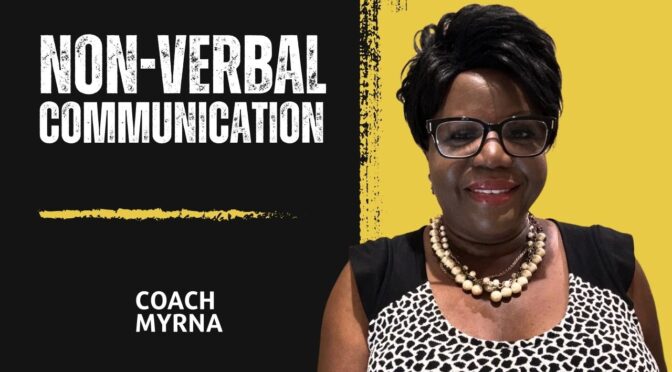Nonverbal communication, is a powerful tool that can greatly impact our relationships, both personally and professionally. In fact, research suggests that up to 93% of communication is nonverbal. This means that mastering the art of, nonverbal communication, can significantly enhance our connections with others. In this article, we will explore 10 strategies to enhance, nonverbal communication, for better relationships.
Download the podcast here:
Key Takeaways:
-
Maintaining eye contact is a powerful form of nonverbal communication that conveys interest and attentiveness.
-
Paying attention to body language, such as open body language and leaning in, can demonstrate attentiveness and receptiveness.
-
Subtly mirroring the body language and gestures of the person you're communicating with can create a sense of rapport and connection.
Nonverbal communication: Maintaining Eye Contact
Eye contact is a vital component of, nonverbal communication. It conveys interest, sincerity, and attentiveness. When speaking with someone, maintaining appropriate eye contact signals your engagement and openness to communication. While it may be more comfortable to look away, maintaining eye contact is essential for conveying interest and building connections. Just like in romance movies, eye contact can convey love and interest. So, make an effort to maintain eye contact and let your eyes do the talking.
Pay Attention to Body Language
Body language speaks volumes in communication. Crossed arms, fidgeting, and avoiding eye contact can convey disinterest or defensiveness. On the other hand, open body language and leaning in can demonstrate attentiveness and receptiveness. It's important to be aware of your own body language and pay attention to the body language of others. By being mindful of your body language, you can ensure that you are conveying the right message and fostering better relationships.
Paid link

Seduce him without saying a word,
Make him miss you
Make him like you
Make him always think of you
Make him faithful to you
Make him wild and intimate towards you on bed
Make him listen to you
and much more..
Get 5% off with coupon code MYRNA5
Nonverbal Communication: Mirror and Match
Mirroring and matching is a technique used to create rapport and connection with others. By subtly mirroring the body language and gestures of the person you're communicating with, you can create a sense of similarity and understanding. However, it's important to be careful not to mimic too closely, as it may come across as insincere or mockery. Mirroring and matching can be particularly useful in sales or any situation where building rapport is important. By mirroring the other person's body language, you can establish a connection and make them feel more comfortable.
Nonverbal communication examples: Regulate Your Tone and Pitch
The tone and pitch of your voice play a significant role in how your message is received. Speaking clearly with a tone that matches the context of the conversation is crucial. A warm and friendly tone can foster trust and rapport, while a harsh or monotone voice can create tension. It's important to be mindful of your tone and pitch and adjust them accordingly. If you're speaking to someone with a soft-spoken demeanor, tone down your energy level to match theirs. Conversely, if you're speaking to someone with high energy, bring up your energy level to match theirs. By regulating your, tone and pitch, you can effectively convey your message and build stronger connections.
Nonverbal Communication: Facial Expressions
Facial expressions are a powerful form of nonverbal communication. They convey a wealth of emotions and intentions. A genuine smile can express warmth and approachability, while appropriate facial expressions can match the tone of the conversation. Smiling genuinely goes a long way in building connections and fostering trust. So, remember to smile genuinely and use appropriate facial expressions to convey your emotions and intentions.
Non verbal Communication: Respect Personal Space
Respecting personal boundaries is crucial in nonverbal communication. Invading someone's personal space can make them feel uncomfortable or threatened. It's important to maintain an appropriate distance to communicate respect and consideration. While personal space may vary depending on cultural norms and individual preferences, a general rule of thumb is to maintain at least an arm's length distance from someone you're not familiar with. Only get close to someone's face if you're about to kiss them. By respecting personal space, you can create a comfortable environment for communication and build better relationships.

Listen Attentively
Listening attentively is an essential aspect of nonverbal communication. Nonverbal cues can be valuable tools for active listening. Maintaining eye contact, using facial expressions to show understanding or empathy, and leaning in can signal to the speaker that you're fully engaged in the conversation. It's important to be present and actively listen to the person speaking. Even if you're not interjecting or responding, show your engagement through nonverbal cues such as nodding or saying phrases like “I understand.” By listening attentively, you can strengthen your connections and build better relationships.
Practice Empathy
Empathy is the ability to understand and share the feelings of others. By paying attention to nonverbal cues such as facial expressions and body language, you can better understand the emotions and perspectives of those around you. This fosters deeper connections and stronger relationships. When someone is sharing a sad story, show empathy by expressing your condolences or sadness. By practicing empathy, you can create a supportive and understanding environment for communication.
Seek Feedback
Seeking feedback from trusted friends, family members, or colleagues can provide valuable insights into your nonverbal communication. They can help you identify areas for improvement and make you more aware of your nonverbal cues. Women, in particular, may have unconscious nonverbal cues that they are not aware of, such as eye-rolling or sucking their teeth. By asking for feedback, you can become more conscious of your nonverbal communication and make necessary adjustments.

Be Authentic
Authenticity is key in nonverbal communication. Genuine gestures, expressions, and body language are more likely to foster trust and build meaningful relationships than forced or insincere behaviors. It's important to be true to yourself and let your nonverbal communication reflect your true emotions and intentions. By being authentic, you can create genuine connections and build stronger relationships.
In conclusion, mastering the art of nonverbal communication is essential for building better relationships in all aspects of life. By paying attention to your body language, facial expressions, tone of voice, and personal space, you can convey understanding, empathy, and sincerity. This applies to various settings, whether it's the boardroom, the bedroom, or even a podcast. Nonverbal communication, is a powerful tool that can greatly enhance our connections with others. So, watch your body language, be aware, and be conscious of the messages you're sending nonverbally. Remember, actions speak louder than words.








